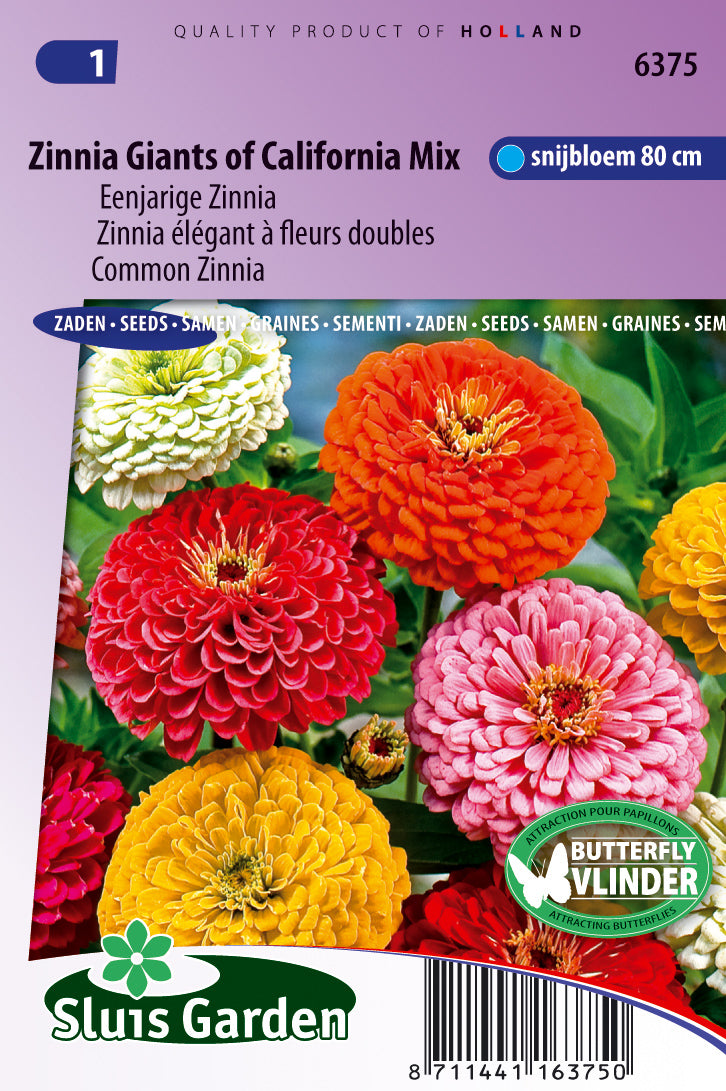1
/
of
1
Zinnia elegans Giant of California Mix
Zinnia elegans Giant of California Mix
Regular price
1.250 KWD
Regular price
Sale price
1.250 KWD
Unit price
/
per
Shipping calculated at checkout.
Couldn't load pickup availability
Zinnia elegans 'Giant of California Mix' is a variety of zinnia known for its large and colorful blooms. Here's a guide on how to grow Zinnia elegans 'Giant of California Mix':
**1. Planting Time:**
- Zinnias are warm-season annuals. Plant seeds directly in the garden after the last frost date when the soil has warmed up, or start seeds indoors 4-6 weeks before the last expected frost.
**2. Planting Location:**
- Choose a sunny location with well-draining soil. Zinnias prefer full sun for optimal growth and flowering.
**3. Soil Preparation:**
- Zinnias thrive in moderately fertile, well-drained soil. Add organic matter, such as compost, to improve soil fertility and structure.
**4. Planting Depth:**
- Sow zinnia seeds directly into the soil at a depth of about 1/4 to 1/2 inch (6-12 mm). Space the seeds according to the packet instructions, usually around 6-18 inches apart, depending on the variety.
**5. Germination Temperature:**
- Zinnia seeds germinate best at temperatures between 70-80°F (21-27°C). The soil temperature should be consistently warm for successful germination.
**6. Watering:**
- Keep the soil consistently moist during the germination period. Once established, zinnias are somewhat drought-tolerant, but regular watering promotes better flowering.
**7. Mulching:**
- Apply a layer of mulch around the plants to help retain soil moisture, suppress weeds, and regulate soil temperature.
**8. Fertilization:**
- Zinnias are not heavy feeders, but you can apply a balanced, all-purpose fertilizer at planting time and then follow up with a light application every 4-6 weeks during the growing season.
**9. Support:**
- While 'Giant of California Mix' zinnias are generally sturdy, tall varieties may benefit from staking to prevent bending or flopping.
**10. Deadheading:**
- Regularly deadhead faded or spent flowers to encourage continuous blooming and prevent the plant from putting energy into seed production.
**11. Pruning:**
- Pinch back young zinnia plants when they are about 6 inches tall to encourage branching and a bushier habit.
**12. Pests and Diseases:**
- Zinnias are relatively resistant to pests and diseases. However, keep an eye out for aphids, spider mites, or powdery mildew. Treat any issues promptly with insecticidal soap or fungicides as needed.
**13. Cutting and Bouquets:**
- Zinnias make excellent cut flowers. Harvest blooms in the morning when they are at their freshest. Regular cutting can also encourage more flowering.
**14. Companion Planting:**
- Zinnias work well in flower beds, borders, or mixed plantings. They attract pollinators like butterflies and bees.
By following these guidelines, you can grow a vibrant and colorful display of Zinnia elegans 'Giant of California Mix' in your garden. Enjoy the large, eye-catching blooms throughout the growing season.
**1. Planting Time:**
- Zinnias are warm-season annuals. Plant seeds directly in the garden after the last frost date when the soil has warmed up, or start seeds indoors 4-6 weeks before the last expected frost.
**2. Planting Location:**
- Choose a sunny location with well-draining soil. Zinnias prefer full sun for optimal growth and flowering.
**3. Soil Preparation:**
- Zinnias thrive in moderately fertile, well-drained soil. Add organic matter, such as compost, to improve soil fertility and structure.
**4. Planting Depth:**
- Sow zinnia seeds directly into the soil at a depth of about 1/4 to 1/2 inch (6-12 mm). Space the seeds according to the packet instructions, usually around 6-18 inches apart, depending on the variety.
**5. Germination Temperature:**
- Zinnia seeds germinate best at temperatures between 70-80°F (21-27°C). The soil temperature should be consistently warm for successful germination.
**6. Watering:**
- Keep the soil consistently moist during the germination period. Once established, zinnias are somewhat drought-tolerant, but regular watering promotes better flowering.
**7. Mulching:**
- Apply a layer of mulch around the plants to help retain soil moisture, suppress weeds, and regulate soil temperature.
**8. Fertilization:**
- Zinnias are not heavy feeders, but you can apply a balanced, all-purpose fertilizer at planting time and then follow up with a light application every 4-6 weeks during the growing season.
**9. Support:**
- While 'Giant of California Mix' zinnias are generally sturdy, tall varieties may benefit from staking to prevent bending or flopping.
**10. Deadheading:**
- Regularly deadhead faded or spent flowers to encourage continuous blooming and prevent the plant from putting energy into seed production.
**11. Pruning:**
- Pinch back young zinnia plants when they are about 6 inches tall to encourage branching and a bushier habit.
**12. Pests and Diseases:**
- Zinnias are relatively resistant to pests and diseases. However, keep an eye out for aphids, spider mites, or powdery mildew. Treat any issues promptly with insecticidal soap or fungicides as needed.
**13. Cutting and Bouquets:**
- Zinnias make excellent cut flowers. Harvest blooms in the morning when they are at their freshest. Regular cutting can also encourage more flowering.
**14. Companion Planting:**
- Zinnias work well in flower beds, borders, or mixed plantings. They attract pollinators like butterflies and bees.
By following these guidelines, you can grow a vibrant and colorful display of Zinnia elegans 'Giant of California Mix' in your garden. Enjoy the large, eye-catching blooms throughout the growing season.
Share

